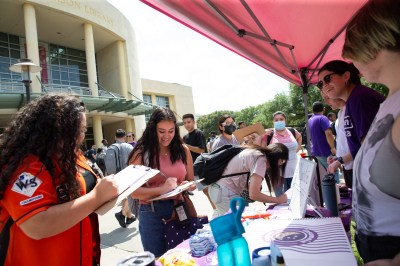Social media users are raising alarm over federal legislation they claim could prevent some women from registering to vote. The bill, H.R. 22—the “Safeguard American Voter Eligibility Act (SAVE)”—was introduced by Republican Rep. Chip Roy of Texas and would require Americans to provide “documentary proof of citizenship” to register to vote.
Noncitizen voting in federal elections is already illegal, criminalized, and occurs rarely, but supporters say the legislation is necessary to ensure the security of U.S. elections. Critics argue that women who have married and changed their legal name would be unable to provide their birth certificate as documentary proof of citizenship because the name listed would not match their current name.
“ALL THE MARRIED LADIES -- READ THIS!!!!!” one Threads user posted. “The House has just reintroduced the SAVE Act which would require a passport or birth certificate as proof of voting eligibility. If you do not have a passport, you will need a birth certificate. IF YOU CHANGED YOUR NAME WHEN YOU MARRIED, your birth certificate has your maiden name & cannot be used as voter ID.” The account added, “You are being disenfranchised.”
Popular left-wing Instagram accounts, including “All Things Democracy” and “Resist + Rise Up Movement,” posted a video message warning internet voters of the bill’s contents. “HR22 (SAVE ACT) is back 69m Women could lose Voting Rights,” text on the video claimed.
Joni Bonnemort, an internet influencer with more than 25,000 followers on TikTok, went even further to claim the SAVE Act would make any woman who has married and changed her legal name ineligible to vote. “If you are a woman that has changed your name from your birth certificate—let’s say through marriage, and you took your husband’s name—you are no longer eligible to vote if this bill passes the Senate,” she said in a video post, which has accumulated 2.6 million views. “69 million woman have changed their last name from their birth certificate and would be ineligible to vote.”
The bill would not change how voters present identification at the polls, but requires that individuals registering to vote present identification that confirms their U.S. citizenship. While it is true that, under the text of the SAVE Act, eligible voters who have changed their legal name since birth—such as married women, transgender individuals, and Guns N’ Roses frontman Axl Rose—might not be able to verify their U.S. citizenship with a birth certificate, such claims are missing some context. The bill requires states to establish a process to resolve potential discrepancies present in voters’ documentary proof of citizenship. Supplementary documentary proof that confirms one’s legal name change, such as a marriage certificate, could be used to verify citizenship, although the bill’s language does not state that option outright. Instead, the SAVE Act delegates that authority to each state, which would be “subject to any relevant guidance adopted by the Election Assistance Commission,” an independent, bipartisan federal agency made up of four commissioners.
However, claims that any person who has changed their legal name since birth would be “no longer eligible to vote if this bill passes the Senate” under the SAVE Act are false. The bill’s text provides numerous forms of documentation that can verify U.S. citizenship, though the two most accessible for American voters would be a valid U.S. passport or birth certificate. Moreover, the SAVE Act would need to be passed by both the House of Representatives and the Senate before reaching the president’s desk to be signed. In July, the House in the 118th Congress did pass the SAVE Act on a 221-198 vote—with all GOP House members, plus five House Democrats, voting in favor of the bill—but that congressional term expired in January. Roy has introduced the SAVE Act in the 119th Congress, but the House would have to pass the bill again, and it would have to go through the Senate. Republican Sen. Mike Lee of Utah introduced the SAVE Act in the Senate in May and has said he will introduce it again in the new session, though he has not done so to date.
Similarly, the claim that 69 million women “would be ineligible to vote” is also false. The figure “69 million” represents the estimated number of married women who have changed their legal name, as cited in an analysis of the SAVE Act from the Center for American Progress (CAP), a public policy think-tank with a progressive bent. “84 percent of women who marry change their surname,” CAP’s Greta Bedekovics and Sydney Bryant wrote, citing a Pew Research Center study, “meaning as many as 69 million American women do not have a birth certificate with their legal name on it and thereby could not use their birth certificate to prove citizenship.” That does not mean, however, that they would be unable to register to vote under the SAVE Act.
Under the SAVE Act, what documents could individuals use to prove their U.S. citizenship? As mentioned, they could provide either 1) their birth certificate together with a federal, state, or tribal government-issued photo ID, such as a driver’s license, or 2) a valid U.S. passport. Another option to prove U.S. citizenship listed in the bill is “a form of identification issued consistent with the requirements of the REAL ID Act of 2005 that indicates the applicant is a citizen of the United States. However, as Bedekovics and Bryant noted, “the Real ID Act of 2005 does not include a federal requirement for Real IDs to indicate citizenship status, and no state’s Real ID indicates citizenship status on the card.” They added, “Legally residing noncitizens can also get a Real ID.”
The SAVE Act allows for other forms of documentary proof, though not forms most American citizens have at their disposal. Those who have served in the military can provide proof of citizenship by submitting their military ID—which lists place of birth—along with their official U.S. military record of service. For those not in the military, a government-issued photo ID from a federal, state, or tribal government that lists the individuals’ place of birth would suffice; but most government-issued photo IDs do not list place of birth. In those cases, individuals could pair their government-issued photo ID with either an “extract from a United States hospital Record of Birth,” “a final adoption decree,” “a Consular Report of Birth Abroad of a citizen,” “a Naturalization Certificate or Certificate of Citizenship, or “an American Indian Card” classified with KIC (shorthand for the Kickapoo tribe), which through a 1983 federal law recognized citizenship for Kickapoo Native American tribal members. Yet, those options too would face the same name discrepancy issue if those records were obtained prior to a legal name change, such as getting married and adopting their partner’s last name.
But advocates of the bill have firmly rejected any notion that this could prevent married women who have changed their name from registering to vote. In fact, Roy says his bill addresses this issue. “The legislation provides a myriad ways for people to prove citizenship and explicitly directs States to establish a process for individuals to register to vote if there are discrepancies in their proof of citizenship documents due to something like a name change,” Roy said in a statement his office shared to The Dispatch Fact Check.
The SAVE Act states,
Subject to any relevant guidance adopted by the Election Assistance Commission, each State shall establish a process under which an applicant who cannot provide documentary proof of United States citizenship … may, if the applicant signs an attestation under penalty of perjury that the applicant is a citizen of the United States and eligible to vote in elections for Federal office, submit such other evidence to the appropriate State or local official demonstrating that the applicant is a citizen of the United States and such official shall make a determination as to whether the applicant has sufficiently established United States citizenship for purposes of registering to vote in elections for Federal office in the State.
Roy’s office directly cited this section of the SAVE Act to The Dispatch Fact Check as evidence that the legislation does not ignore name-change discrepancies, but rather “explicitly directs” the states to rectify such discrepancies. “In plain language, the SAVE Act expects states to ask for supplementary documents, such as a marriage certificate, when a birth certificate shows a different name than a person's driver’s license,” Matt Germer, policy director of governance at the R Street Institute, told The Dispatch Fact Check. What could those individual state processes look like? Germer points to Arizona, the only U.S. state to currently require proof of U.S. citizenship to vote in state and local elections. “In practice, applicants with a name mismatch must provide supplementary documentation, such as a marriage certificate,” he said. However, one difference he noted is that whereas the Arizona law permits a birth certificate photocopy as proof of citizenship, the SAVE Act does not.
It’s unclear to what degree those processes could vary from state to state. “Will this involve some combination of second-best documents, sworn attestations, in-person interviews, or maybe something else?” Cato Institute senior fellow Walter Olson wrote in August. “The bill is sparse and vague on these crucial details.”
Instead of stipulating those details in the text of the bill, the SAVE Act delegates such decisions to the Election Assistance Commission (EAC). “The EAC would provide some national-level guidance, but the specifics of the process would be left up to the states,” Germer explained. Would the independent federal agency serve as an advisory commission that would help states develop its own individual processes? Or would it act more like a regulator, seeking to implement a uniform requirement for all 50 states’ processes? That much remains unclear.
Language expressed in the bill’s text at times treats the EAC as an advisory committee, and at other times expresses its role as a regulator. On one hand, Germer explained, the SAVE Act states the EAC shall issue “guidance,” and guidance documents “do not carry the same force of law” as administrative law. But, on the other hand, the bill’s language also clearly states that each state’s process is “subject to any relevant guidance” the EAC adopts. “It’s my initial interpretation that if a state failed to adhere to the guidance set out by the EAC, it may expose them to litigation on those grounds,” Germer said. “That said, the SAVE Act contemplates the role of the EAC in a few different ways, and it’s possible some of those roles would have their acts carry different weight.”
The bill states that the EAC shall create an affidavit for those unable to provide documentary proof of citizenship, which, according to Germer, “puts a fair amount of power into the EAC to create a national standard.” But, Germer adds, “the bill also requires states to provide disability accommodations ‘in consultation with’ the EAC, an approach that keeps the states as the central actor and the EAC as an adviser.” Therefore, the specific role the SAVE Act tasks the EAC with when it comes to developing “relevant guidance” remains an open question.
When asked what role the EAC is intended to have in establishing “relevant guidance,” a spokesman for Roy’s office told The Dispatch Fact Check, “As the bill states, the EAC is there to provide guidance.”
If you have a claim you would like to see us fact check, please send us an email at factcheck@thedispatch.com. If you would like to suggest a correction to this piece or any other Dispatch article, please email corrections@thedispatch.com.







Please note that we at The Dispatch hold ourselves, our work, and our commenters to a higher standard than other places on the internet. We welcome comments that foster genuine debate or discussion—including comments critical of us or our work—but responses that include ad hominem attacks on fellow Dispatch members or are intended to stoke fear and anger may be moderated.
With your membership, you only have the ability to comment on The Morning Dispatch articles. Consider upgrading to join the conversation everywhere.